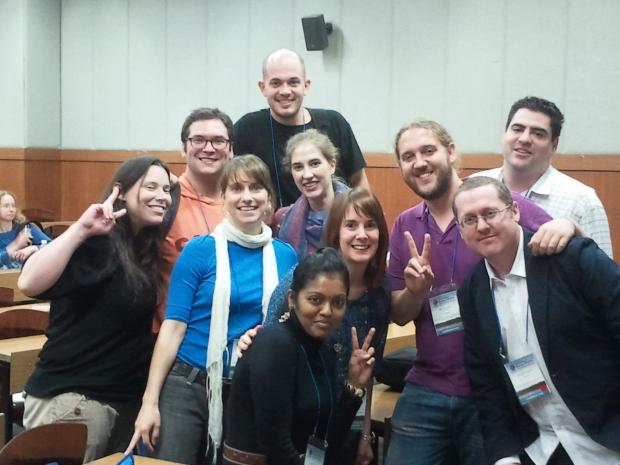I first met *Susan Barduhn at the 2006 KOTESOL International Conference. When I saw her presentation, What Keeps Teachers Going? What Keeps Teachers Developing?, I was already saving up for my MA TESOL at The SIT Graduate Institute. Observing how she engaged the audience, I realized once again why I had to go to Vermont, USA. Finally, in 2007, I sat in my first classroom with her. We sat in a circle, and she asked us questions. Once again, I was engaged.
This is what Susan does. She asks questions and engages learners to explore their beliefs and come to their own conclusions. And this is what she did for her plenary audience at IATEFL Liverpool. In her talk, Language Dealing, she helped us ponder the statement, ” ‘If English were a drug, expatriate teachers would be the dealers…’ Via metaphors of drugs, drug dealers, postmodern dance and medieval knights errant, she explores the identity and intentions of EFL teachers. Through her metaphorical speculations she suggests that the “phenomenon of expatriate English teachers could be considered a historical, cultural movement.”
Susan brought many interesting points and examples to the surface, including one where she compares expat EFL teachers to expat teachers of Mandarin. I found myself nodding in relief throughout her talk: relief in knowing that someone was speaking for the itinerant teacher; that someone was bringing more clarity to our story. But it was one point that really made an impact on me, and I’ll only focus on this discovery. I highly recommend watching her talk to get all the juicy details.
The Question
Is English really the drug, or is it something else? Is it pedagogy? Is it culture? Is it values?
This is what Susan wanted to find out when she interviewed 200 native and non-native speakers of English (must have lived in at least two countries outside their country of origin for a total of 6 years). One of the questions she asked was, “What motivated you to live in each country?” This is what she discovered about why these teachers progressed through each country:
- Country 1: Travel, adventure, Peace Corps
- Country 2: Prof dev, culture, love of teaching
- Country 3: Love of teaching, prof dev, career advancement
- Country 4: Career advancement, economics, prof dev
- Country 5: Prof dev, career advancement, economics
- Country 6: Family, attracted to change and risk, prof dev
- Country 7: Love of teaching, prof dev, attracted to change and risk
- Country 8: Looking for greener pastures, attracted to change and risk, personal development
Then she asked us to look at the same answers like this:
- Country 1: Travel, adventure, Peace Corps
- Country 2: Prof dev, culture, love of teaching
- Country 3: Love of teaching, prof dev, career advancement
- Country 4: Career advancement, economics, prof dev
- Country 5: Prof dev, career advancement, economics
- Country 6: Family, attracted to change and risk, prof dev
- Country 7: Love of teaching, prof dev, attracted to change and risk
- Country 8: Looking for greener pastures, attracted to change and risk, personal development
And so at the end of the talk, she posed a new question:
Could the drug actually be professional and personal development?
To this, a resounding “yes!” rang in my mind. It connected to one of my favorite posts by one of my favorite ELT bloggers, Laura Phelps: TEFLing at 35: a life gone right. In this post she expresses many reasons why she hopes she will still be teaching in different parts of the world by the time she’s 35, but this is the one I think speaks true for many teachers out there:
I want to be a 35 year-old who feels confident in the work I’ve chosen to pursue and who learns for the love of learning, not studies for the extra pound an hour. I want not to be freaked out by the prospect of no computers, no photocopier, no board, no books, no desks and no chairs. I want to keep those students in my life who make me cry with laughter, cry with despair, and open my eyes. I want to mentor and be mentored.
Over the past year — or maybe 18 months (see Things that may not have happened if I didn’t use twitter for an exploration of personal and professional development by expat in Korea, Alex Walsh) — I have observed and been involved in amazing organizations and loose collectives of professional development: iTDi, KELTchat, AusELT, KOTESOL and ELTchat to only name a few. I have been reading incredible blogs by teachers who are diving deep into their teaching world. Choose any of the blogs on the write-hand side of this page find and you’ll find their stories.
Who are these teachers? Most of them are exactly who Susan describes.
I am extremely grateful to Susan for doing this research and for presenting it to us in this way. I very much look forward to learning what else she finds out about this identity group.
-For a summary of Susan Bardhun’s IATEFL plenary please visit Chia Suan Chong’s post written live from the talk.
* Susan is a Professor and the Academic Chair of the MA TESOL Low Residency Program at The SIT Graduate Institute. Watch her IATEFL interview to learn more about the program.
